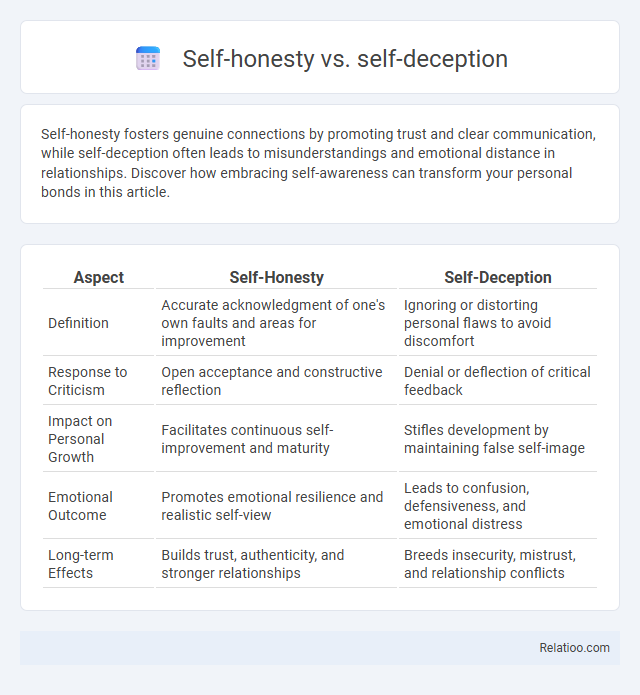Self-honesty fosters genuine connections by promoting trust and clear communication, while self-deception often leads to misunderstandings and emotional distance in relationships. Discover how embracing self-awareness can transform your personal bonds in this article.
Table of Comparison
| Aspect | Self-Honesty | Self-Deception |
|---|---|---|
| Definition | Accurate acknowledgment of one's own faults and areas for improvement | Ignoring or distorting personal flaws to avoid discomfort |
| Response to Criticism | Open acceptance and constructive reflection | Denial or deflection of critical feedback |
| Impact on Personal Growth | Facilitates continuous self-improvement and maturity | Stifles development by maintaining false self-image |
| Emotional Outcome | Promotes emotional resilience and realistic self-view | Leads to confusion, defensiveness, and emotional distress |
| Long-term Effects | Builds trust, authenticity, and stronger relationships | Breeds insecurity, mistrust, and relationship conflicts |
Understanding Self-Honesty: Definition and Importance
Self-honesty involves recognizing and accepting one's true feelings, thoughts, and motives without distortion or denial, forming the foundation for authentic self-awareness. It contrasts with self-deception, where individuals unconsciously or consciously ignore uncomfortable truths to protect their self-image, leading to confusion and impaired decision-making. Embracing self-honesty enhances emotional intelligence, fosters personal growth, and promotes healthier relationships by encouraging transparency and genuine self-reflection.
What Is Self-Deception? Patterns and Pitfalls
Self-deception involves convincing yourself of a false reality to avoid uncomfortable truths, often leading to distorted self-awareness and impaired decision-making. Patterns of self-deception include ignoring evidence, rationalizing mistakes, and selective memory, which create internal conflicts and hinder personal growth. Recognizing these pitfalls is crucial for Your ability to practice genuine self-honesty, fostering clarity and emotional resilience.
Psychological Roots of Self-Deception
Self-deception originates from cognitive dissonance and defense mechanisms that protect the ego from uncomfortable truths, often driven by unconscious biases and emotional needs. In contrast, self-honesty involves conscious acknowledgment of one's thoughts and behaviors, fostering psychological growth and resilience. Understanding these psychological roots helps differentiate genuine self-awareness from the subconscious distortions that characterize self-deception.
Benefits of Embracing Self-Honesty
Embracing self-honesty fosters authentic personal growth by enabling clear recognition of one's strengths and weaknesses, which enhances decision-making and emotional resilience. It reduces cognitive dissonance and internal conflict, promoting mental well-being and long-term psychological health. In contrast to self-deception, self-honesty cultivates genuine self-awareness, leading to improved relationships and greater alignment with personal values.
The Consequences of Self-Deception
Self-deception often leads to distorted self-perceptions, impairing your ability to make informed decisions and fostering unhealthy behaviors. Unlike self-honesty, which promotes clarity and personal growth, self-deception results in denial or avoidance of uncomfortable truths, causing long-term psychological and emotional consequences. Recognizing the differences between self-honesty and self-deception is crucial for improving mental well-being and achieving authentic self-awareness.
How to Recognize Self-Deceptive Behaviors
Recognizing self-deceptive behaviors involves identifying patterns where individuals distort reality to avoid uncomfortable truths, such as rationalizing failures or selectively ignoring contradictory evidence. These behaviors often manifest through denial, minimization, or projection, which contrast sharply with self-honesty that requires acknowledging one's flaws and mistakes without distortion. Developing self-awareness and seeking honest feedback from trusted sources can help differentiate genuine self-reflection from self-deception.
Overcoming Barriers to Self-Honesty
Overcoming barriers to self-honesty requires recognizing and confronting self-deception, which often manifests as biased beliefs that protect your ego but hinder personal growth. Developing self-awareness through reflective practices and seeking feedback from trusted sources can dismantle these cognitive defenses, making it easier to face uncomfortable truths about yourself. Consistent commitment to honesty fosters emotional resilience and authenticity, ultimately leading to more meaningful decisions and relationships.
Strategies to Cultivate Self-Honesty
Cultivating self-honesty requires consistent introspection and the practice of acknowledging uncomfortable truths without judgment or avoidance. Techniques such as journaling personal experiences, seeking honest feedback from trusted individuals, and mindfulness meditation enhance awareness of one's genuine thoughts and emotions. Developing self-honesty counters self-deception by fostering transparency with oneself, promoting emotional intelligence and authentic decision-making.
Self-Honesty vs Self-Deception in Relationships
Self-honesty in relationships fosters genuine communication and trust by encouraging individuals to acknowledge their true feelings and intentions, creating a foundation for deeper connections. Self-deception, however, can lead to misunderstandings and unresolved conflicts as it distorts reality and prevents acknowledgment of personal or partner shortcomings. Your ability to practice self-honesty strengthens emotional intimacy and supports healthier, more authentic interactions.
Building a Life of Integrity: Moving from Deception to Authenticity
Self-honesty is the foundation for building a life of integrity, requiring you to confront your true thoughts and feelings without distortion. Self-deception, by contrast, creates barriers that prevent genuine growth and authenticity, leading to internal conflict and mistrust. Embracing self-honesty enables transformation from false narratives to authentic living, fostering deeper self-awareness and consistent ethical actions.

Infographic: Self-honesty vs Self-deception
 relatioo.com
relatioo.com